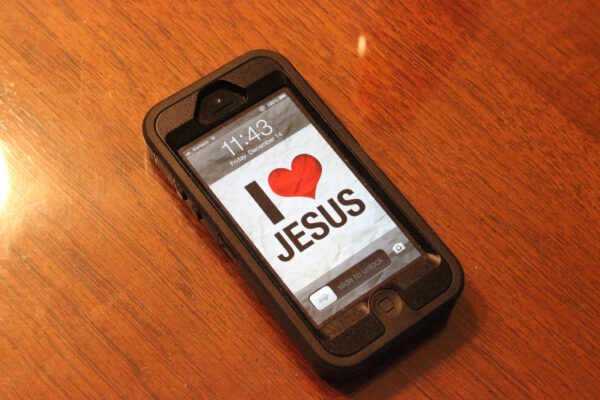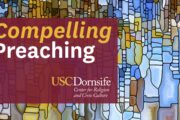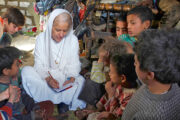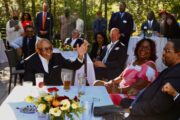This post originally appeared on Trans/Missions, the USC Knight Chair in Media and Religion site.
The only thing Americans seem to like more than the culture war is trying to make money off the culture war. As soon as the “Jesus fish” appeared on the back of a minivan, another enterprising group started selling the “The Darwin fish” (it has feet). “The Truth fish” ate “The Darwin fish,” “The Gefilte fish” arrived on the scene, and even people who liked the band Phish jumped in. A small but vocal segment of our country decided to play out centuries old debates about religion, identity, ultimate truth, and the meaning of life by sticking cheap metallic decals on the back of their cars. Talk about merging the sacred and the profane.
Paul Vitello writes about the next evolution of this phenomenon in a New York Times story about the proliferation of iPhone applications dedicated to getting the upper hand in the never-ending argument between Christians and atheists. Savvy application developers are arming atheists with the ability to quickly look up contradictory and ridiculous verses in the Bible and flummox the most knowledgeable Christian believer.
Christians, on the other hand, can make hasty work of atheists’ standard arguments about the lack of ultimate truth with primers on how to skillfully back them into a logical corner. Vitello does a good job of contextualizing this phenomenon within a cultural shift that has seen both the rise of the new atheists and what he calls our “fractious talk-show culture.”
Unfortunately, the new technology doesn’t seem to be adding anything new to the content of the debate. By opening up the digital market to culture war profiteering, these apps allow skeptics and believers to outsource not only their knowledge but the foundations of their own convictions all for a couple of bucks. Why would anyone actually internalize (or let alone memorize) what they believe when they can just look it up? Maybe I’m just rehashing arguments about the internet making us stupid but that is only part of it.
Another part that is missing in the discussion, and the reporting, is what religion actually is outside of our narrow culture-warring view. Yet again, I feel the need to point out that reducing religion, this time to a set of texts, misses the mark. Whether the believers do it, or atheists, or reporters who do not pause for a moment to point it out, scripture alone does not a religion make. Religion is an historically unfolding system of living, made up of rituals, texts, traditions, teachings, theologies and institutions. Arguing on this narrow battlefield may make for good bar banter and selling products but it doesn’t make for honest discussion.
The article itself is a pretty straight down the line conflict story. Christians can’t stand atheists. Atheists ridicule Christians. Academics would rather we all read Kant. The only winner is the news outlet that sells a paper or grabs another eyeball. Reporting on the two sides misses the opportunity to probe others angles in this story and to point out the fundamental misunderstanding of religion by these two sets of fundamentalists.
Photo Credit: Daniel Hong/Flickr
Brie Loskota is the former executive director (2016-2021) of the USC Center for Religion and Civil Culture.






